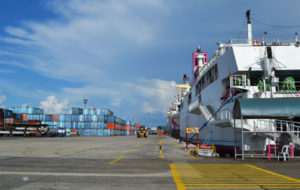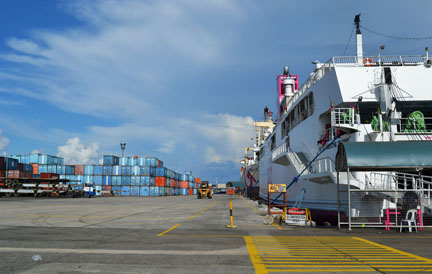
The Philippine Inter-Island Shipping Association (PISA) has identified strategies the government should undertake to support the association’s vision of a modern and competitive domestic shipping industry.
The strategies, according to PISA executive director Atty. Pedro Aguilar, are anchored on PISA’s long-term vision that by 2030, the domestic shipping sector will be a key support to national development and a vital partner of domestic and regional traders in the supply chain, providing connectivity for people and access of goods to markets, even as the shipping sector maintains safe, efficient, and competitive operations.
The recommendations are guided by the mindset that shipping follows trade in goods and movement of people, and that it should provide access to markets, said Aguilar in a presentation during the recent launch of the Maritime Industry Authority’s (Marina) development roadmap.
READ: Marina launches 10-year maritime industry roadmap
Long-term plan
For the long term, Aguilar said PISA, the umbrella organization of domestic shipping and shipping-related associations, seeks greater engagement with policymakers on shipping’s role in trade.
Its recommendations include a clear strategy by the government for the manufacturing and agricultural sectors so that shipping “knows where and what to invest in.”
Along with this, PISA suggests the creation of production clusters around hub ports to develop economies of scale, as the latter, Aguilar noted, is the “greatest contributor to lowering shipping and logistics costs.”
He pointed out that “small ships follow small trade, big ships follow big freight,” a situation that is “very true in the case of Visayas and Mindanao.”
He continued that local traders usually have the mindset of “tingi-tingi (piecemeal) system,” which oftentimes leads PISA member shipping lines to “resort to frequency rather than volume.”
“If we resort to frequency than volume, then the outcome would be higher cost, higher freight. Now that is one of the reasons why we have small ships unlike overseas with bigger ships.”
Part of the vision is for clusters and hub ports to dictate the rise of roads and housing in support of domestic and import-export trade.
Short-term scheme
For the short term, PISA recommends a clear government strategy in addressing the port and logistics needs of domestic trade, as well as in improving and modernizing high-traffic domestic hub ports.
Domestic hub ports should also be provided with state-of-the-art and well-maintained navigational aids and eventually with a vessel-traffic monitoring system. There should likewise be an efficient system for monitoring navigational threats, Aguilar noted.
The group suggests a modern, well-maintained weather forecasting system to support safe shipping. Funding for this system should be prioritized, and the salaries of weather staff increased.
Strategies for structural reform to achieve a modern and efficient fleet include the phase-out of old and substandard vessels, which Aguilar noted Marina has started doing. Another is to develop the country’s shipbuilding capacity so it serves the requirements of the domestic fleet, both big and small ships.
Ports should be modernized to support gearless ships. Currently, domestic shipping lines still have to acquire self-sustaining vessels due to the lack of adequate port equipment, especially in outports. This, in turn, hikes operating costs for shipping lines.
For safe operations, PISA is suggesting that all ships be classified either by a single local classification society or an International Association of Classification Societies member. The group is pushing for only one local classification society manned by officials with “unquestionable competence, experience, and integrity.” Currently, there are eight classification societies, which for Aguilar are “too many.”
He said they also recommend the strict implementation and governance/audit of the International Management Code for the Safe Operation of Ships and for Pollution Prevention and the National Safety Management Code.
To attract excellent crew to the supply pipeline, PISA suggests career promotions, cadetships and overseas opportunities; the joint promotion of science, technology, engineering, and mathematics studies and a culture of excellence in maritime schools; a change in the minimum manning regulations; and a special taxation regime for seafarers in domestic shipping.
PISA noted main hurdles to realizing this vision.
On port infrastructure, PISA said the Philippine Ports Authority (PPA) “should only be a regulatory body” and not engage in port development and management to avoid conflict of interest, as it does when it keeps 10% of the rates it approves.
Aguilar added that it is likewise difficult to implement the hub port strategy due to pressure from local politicians to create ports that are often not economically viable.
“We see so many ports in the Visayas and Mindanao where PPA was forced to put them up upon the insistence of the local government (even though the areas don’t have) enough traffic,” Aguilar noted.
He described as problematic ports that are not regularly dredged, and those that are designed without considering the draft requirements of vessels.
On port operations, one hurdle PISA pointed out is that some ports have only one cargo-handling operator “that practically dictates port charges.”
He added there is a lack of focus and strategy to address berth congestion in Manila and the major growth ports of Cebu, Zamboanga, Iloilo, General Santos, Dumaguete, and Davao.
Regulatory enablers
In order to attain both long- and short-term strategies, PISA has the following recommendations:
- For safe ships, upgrade and restore incentives under Republic Act (RA) No. 9295, or the Domestic Shipping Act, to enable shipowners to invest in younger, if not new ships;
- Amend Presidential Decree (PD) No. 1221 to allow a certain tonnage of Philippine ships to dry dock abroad. Aguilar earlier said that dry-docking in the country is costlier than in overseas;
- Pass a law to mandate a single local classification society;
- On ports, pass a law that would make PPA a regulatory body and see the formation of a separate government body that would develop key port and road infrastructure networks at the lowest possible cost but with the highest quality;
- To lower domestic shipping costs, repeal Executive Order (EO) No. 1088 in favor of the passage of a law mandating open and optional pilotage for domestic ships, unless mandatory pilotage for a port is declared by the proper port authority. Domestic shipping lines have been raising concerns about the high and arbitrary pilotage costs. They said domestic shipping lines usually ply the same routes and their masters already familiar with them, thus pilots are not needed;
- Establish a tonnage tax system instead of an income tax system for domestic shipping;
- Release executive issuances to streamline procedures of various government agencies regulating the shipping industry. For instance, Aguilar noted that Marina has been facilitating the franchise and registry of ships, but problems sometimes fall with other regulating agencies such as the Bureau of Customs and the quarantine body;
- Create a Department of Maritime Affairs–an agency also pushed by other maritime sectors–that will integrate the procedures and rules of various shipping regulators.
- Allow domestic ships to engage in international trade without the need to obtain permits from the maritime authority, as is being practiced in other nations.– Roumina Pablo





